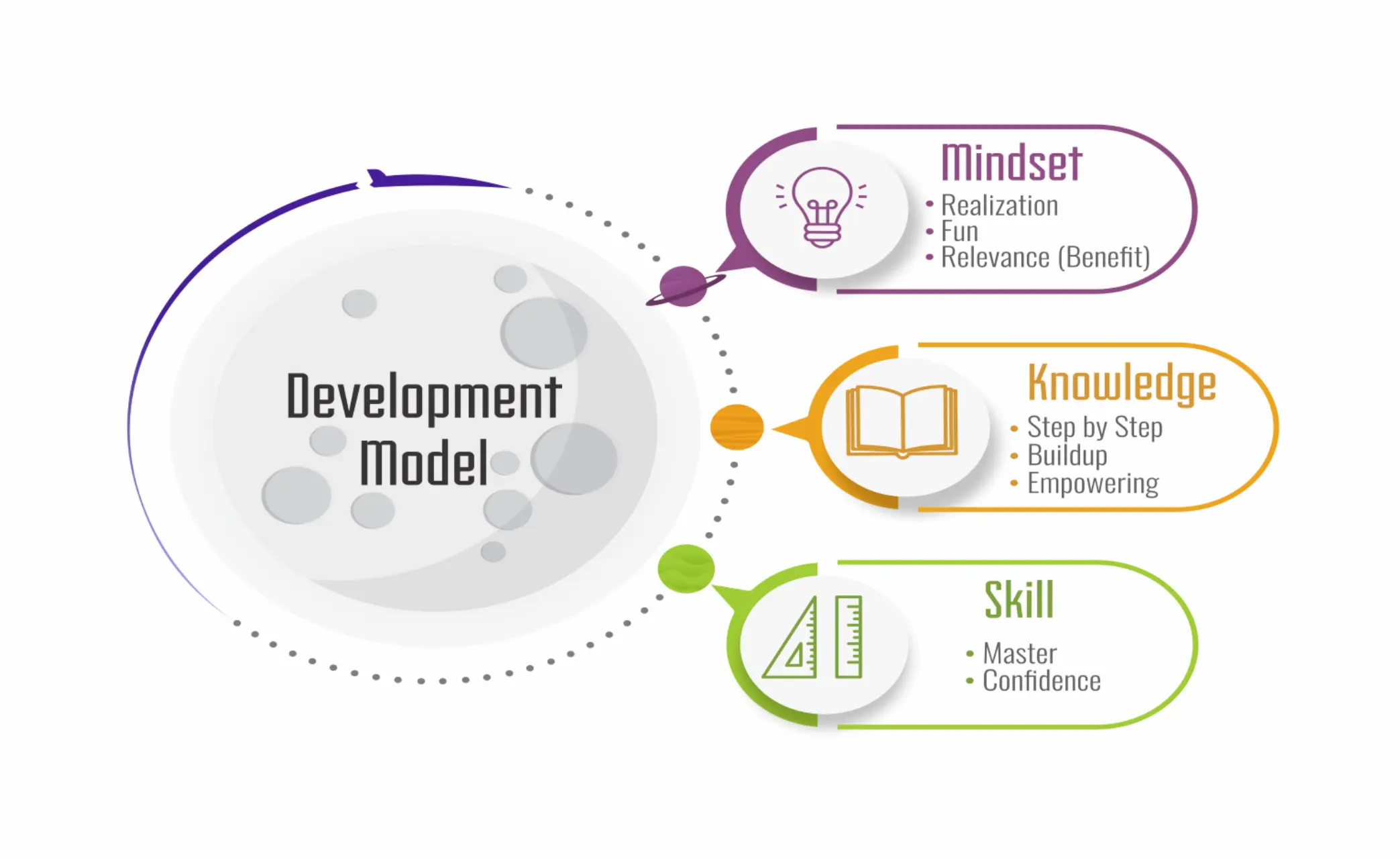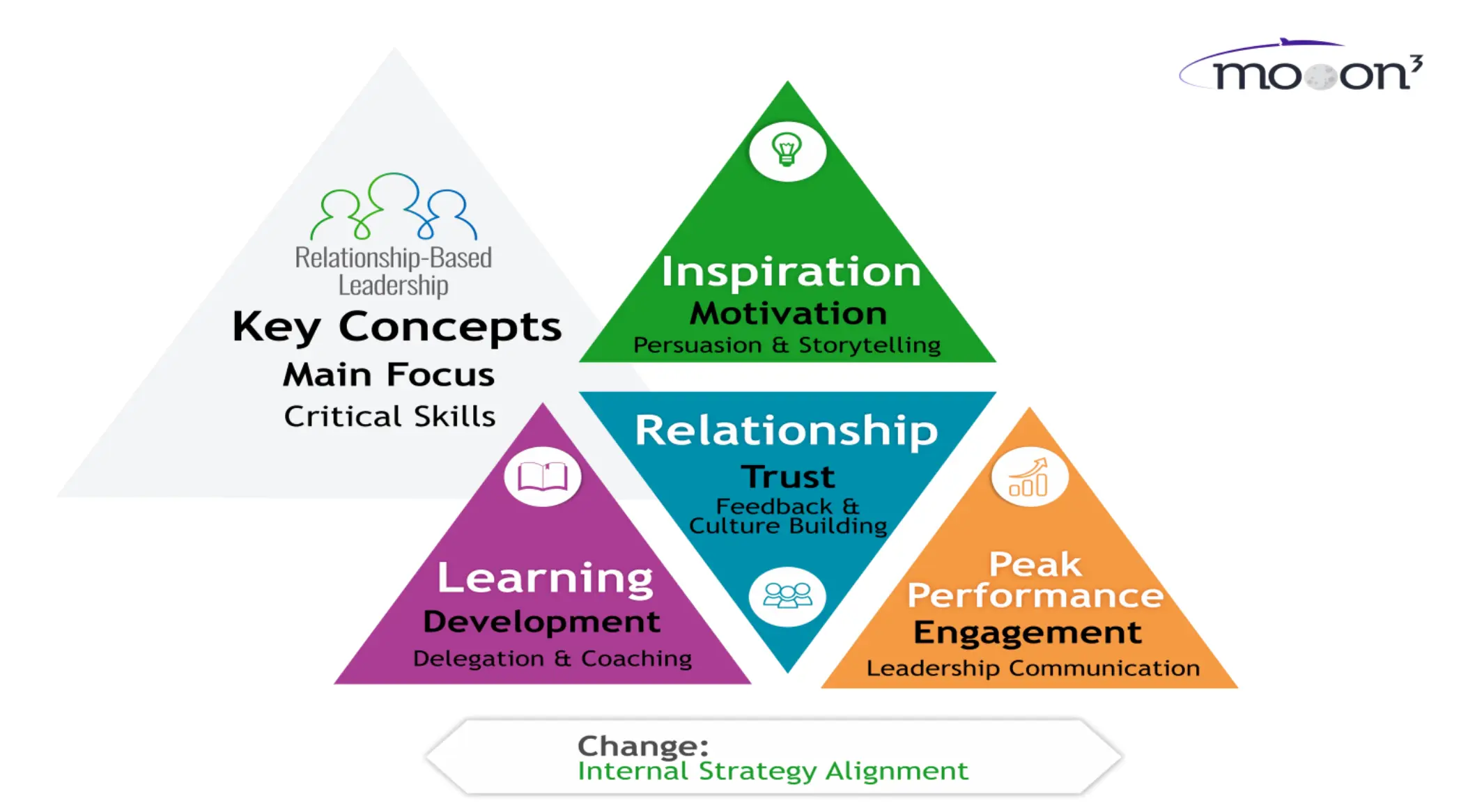Relationship-Based Leadership
Introduction:
Leaders—and not HR—should be at the forefront of developing your employees and driving your Core Values. However, most leaders have never been trained to drive or incorporate values into their day-today tasks. Nor have leaders been properly trained to develop employees based on the organization’s objectives. In today’s competitive world, skills to develop, engage, inspire, and motivate employees with the key company objectives in mind are becoming ever more important.
The Relationship-Based Leadership (RBL) development program was designed based on this premise and in order to empower your leaders to:
Drive your values on a daily basis, &
Develop your employees towards your company’s vision and goals.
In short, the objective of this brief is to illustrate how your leaders—once developed on the RBL model—can use your organization’s Core Values to maximize RoI by developing their subordinate employees to deliver on your objectives. To do so, we will require your HR to be our strongest supporter in this journey.


Our first step in doing so, is to make sure that we clearly understand your core values and your culture.
In this development program, we help your leaders understand the importance of core values and make sure they leave the course understanding how to incorporate your core values into their day-to-day activities such as
Providing constructive but critical feedback to employees
Turning the meeting into an effective session, when someone gives them feedback in a non-constructive manner
How to incorporate core values in delegation skills and focus on the subordinate’s growth during delegation in addition to getting the task done
How to coach with the core values in mind
How to encourage and engage subordinates by storytelling skills
How to run team meetings to solve problems with the core values being present in all decisions
NOTE: If you do not have core values, or are not quite fund of how they were extracted, we have over 15 years of experience of helping corporations extract, design and define their core values.
It is essential to see your company’s leadership style and core values as part of your corporate culture. Many companies are oblivious to the significance of leadership and core values. We highly recommend you to take your core values seriously which will eventually serve as a compass to your employees, especially when they need to make decisions in absence of their line-managers.
Research on the influence of core values and corporate culture conducted by John Kotter, Harvard Business Professor, shows:
Revenues increased 4 times faster in companies that worked on their values and culture
Job creation rates grew to 7 times higher
Stock prices increased 12 times faster
Profits climbed 750% higher
New revenue grew 700%
Customer satisfaction doubled


Relationship-Based Leadership
Your Challenges:
The 2 key challenges that most of our clients have shared with us in the past 15 years are as follows:
“Our leaders excel in their fields of expertise but not in developing people or building rapport with them.”
“We invested heavily in our core values and code of conduct, but our leaders are not applying them.”
In other words, companies invest in the development of their employees and in core values or culture-related services, but see no results in the day-to-day activities of their teams. Why?
Root Cause of the Challenge:
We believe leaders are too much involved in their day-to-day tasks and activities that they can’t find time for the development of their people and the application of the organization’s core values and culture, despite the formal trainings they might have attended.
Our Approach:
Developing subordinates, applying core values to build organizational culture, and keeping the core values in mind at all times are not separate skills. Imagine this situation: You are learning to play the guitar, then you learn how to sing, while your manager asks you to keep a smile on while performing. Alternatively, you can practice doing all 3—playing the guitar, singing and smiling—at the same time right from the start. This is our unique approach with Relationship-Based Leadership.
As far as we are concerned, there is no other training program that simultaneously focuses on:
- Familiarizing leaders with brain-based concepts of leadership and people development
- Incorporating a company’s core values into the skills that leaders use on a daily basis, such as
- Providing critical but constructive feedback to employees
- Delegating with the delegate’s growth in mind
- Coaching,
- Storytelling, &
- Team and individual decision making
- Empowering leaders to A) translate your company’s corporate strategy into their team’s activities and B) to understand strategy as an approach to win, and not a plan to follow or a set of targets to meet.
In addition to being the only leadership development plan with such approach, this development program delivers more than the sum of its parts. This program is based on 16 years of continuous research in neuroscience and leadership, training and coaching of over 1,000 leaders of multinational corporations and local companies on 3 continents, practicing leadership skills and techniques with various teams (remote & in-person), and building on feedback and criticisms of clients, students, colleagues and employees.


What you get:
Experience shows that leaders undergo tangible changes in how they understand “learning” as they find out about the different ways the brain takes in information. While this change helps leaders and their employees to enjoy their work more, participants of this program will find it easier to apply your company’s core values on a daily basis, simply because application of core values has been incorporated in feedback, delegation, coaching and decision making models that they will learn in this program. As such, the following results are expected:
- Higher retention as a result of improved relationship between leaders and subordinates as well as a sense of self-actualization felt by employees who have learned new leadership skills
- More pleasant environment as leaders will learn to create “Fun as Work” instead of just “Fun at Work”
- Easier decision making on part of leaders, and more independent decision making on part of employees as a result of establishment of core values as a compass for decision making
- More encouraged subordinates and the establishment of the culture of storytelling as an effective leadership skill.
All of the above will obviously result in higher financial and lower employee turnover.
Our Development Model:
Adults learn only if they know why they are about to learn something. Thus, our development model is mindset-focused. It’s called MiKS:
Mindset: Realization, Fun, Relevance (Benefit)
To put it briefly, only once we believe in the effectiveness of what we are about to learn, are we able to absorb knowledge in a productive and effective way. We refer to this as “Shaping the Mindset”. This happens when any combination of the following happens: 1) We come to a realization, 2) We enjoy the discussions that led to the shaping of that mindset, and 3) We see the relevance of the subject matter to the area we are hoping to apply it to, here our day-to-day activities.
Knowledge: Step-by-step, Buildup, Empowering
As for knowledge, it has to build up in a step-by-step fashion and give us the feeling of empowerment. This is how most people absorb new information best. Knowledge is best absorbed, when we have the right mindset to learn.
Skill: Practice, Master, Confidence
Only once the knowledge has been imparted to the right mindset, will we be able and motivated to practice the skills and master them. This will positively impact our confidence.


Relationship-Based Leadership
This is a neuroscience-based leadership model that we will use to empower your leaders to drive your core values and build your next generation of leaders who will have a deeper understanding of strategy and how it relates to their everyday activities. This model consists of 3 steps as shown in the model below: Input, Process, & Output.
Input refers to the 3 concepts that our 15 years of research on neuroscience have taught us: Leadership cannot exist in the vacuum. Leadership skills are effective if a leader has a “meaningful relationship” with their employees. This meaningful relationship, neuroscience shows, is highly effective if 3 conditions are met:
- The relationship is based on Mutual Trust
- There are Opportunities for Growth in the team, irrespective of positions available
III. Team environment is as Predictable as possible because uncertainty is an obstacle to learning & growth
For each of the above mentioned factors, we will focus on a set of skills:
- Mutual Trust: How to provide critical but constructive feedback. How to turn a meeting into a productive one, if someone is giving you feedback in a non-constructive way. How to shape a culture of feedback in a team.
- Opportunities for Growth: Delegating with the growth of subordinates in mind & coaching skills
- Predictable Environment: Leadership conversation that are based on latest findings of neuroscience & strategic mindset
Our experience shows that by focusing on these skills, leaders will be able to transform and help their subordinates change. While many of our clients have asked us to run courses on accountability and strategic planning for them, we have learned that focusing on the aforementioned concepts and skills will lead to change of behavior and mindset in ways that:
- Constructive feedback and trust culture result in employees act and make decisions based on the organization’s core values
- Trust-based growth and autonomy (in delegation) result in more independent and accountable employees
- Adopting strategic mindset results in more company-wide strategic alignment

Output
Change of Attitude:
- Core Values-Based Actions & Decision Making
- Accountability
- Strategic Alliance
Process
Skills:
- Feedback & Culture Building
- Delegation & Coaching
- Leadership Conversations & Strategic Mindset
Input
Concepts:
- Mutual Trust
- Opportunities for Growth
- Predictable Environmente


